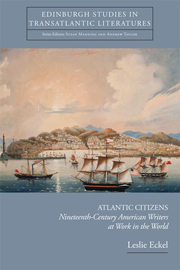Book contents
- Frontmatter
- Contents
- Acknowledgements
- Dedication
- Introduction: The Vocational Routes of American Literature
- 1 Longfellow and the Volume of the World
- 2 Fuller's Conversational Journalism: New York, London, Rome
- 3 ‘A type of his countrymen’: Douglass and Transatlantic Print Culture
- 4 Between Cosmos and Cosmopolis: Emerson's National Criticism
- 5 The Professional Pilgrim: Greenwood Sells the Transatlantic Experience
- 6 Standing Upon America: Whitman and the Profession of National Poetry
- Afterword: Vocation or Vacation? Transatlantic Professionalism Now
- Notes
- Bibliography
- Index
2 - Fuller's Conversational Journalism: New York, London, Rome
Published online by Cambridge University Press: 05 September 2013
- Frontmatter
- Contents
- Acknowledgements
- Dedication
- Introduction: The Vocational Routes of American Literature
- 1 Longfellow and the Volume of the World
- 2 Fuller's Conversational Journalism: New York, London, Rome
- 3 ‘A type of his countrymen’: Douglass and Transatlantic Print Culture
- 4 Between Cosmos and Cosmopolis: Emerson's National Criticism
- 5 The Professional Pilgrim: Greenwood Sells the Transatlantic Experience
- 6 Standing Upon America: Whitman and the Profession of National Poetry
- Afterword: Vocation or Vacation? Transatlantic Professionalism Now
- Notes
- Bibliography
- Index
Summary
When Margaret Fuller left New York for Europe in August of 1846, many of her contemporaries assumed that she had abandoned the United States permanently and that her dispatches from London, Paris, and revolutionary Rome signalled her turn away from a national agenda in literature and criticism. The fact that Fuller herself never returned to American shores has led scholars to conclude that the body of her journalistic work overseas, like her physical body, could not be ‘repatriated’. In this chapter, I contend that Fuller's continuous participation in the work of making American culture at home and abroad marks her as a writer who was at once emphatically national and deliberately transnational. By practising a form of journalism that she described as ‘conversational’, she modelled for her readers the kind of creative transnational exchange that she believed could strengthen American democracy. The very criteria that have been used since the 1840s to exclude Fuller from the American literary canon – her commitment to foreign literatures, her belief in the moral value of a cosmopolitan viewpoint, and her faith in journalism as a means to reach the entire nation at once – argue most strongly for her reinscription into a recognisably American tradition of internationalist thought.
- Type
- Chapter
- Information
- Atlantic CitizensNineteenth-Century American Writers at Work in the World, pp. 46 - 70Publisher: Edinburgh University PressPrint publication year: 2013



